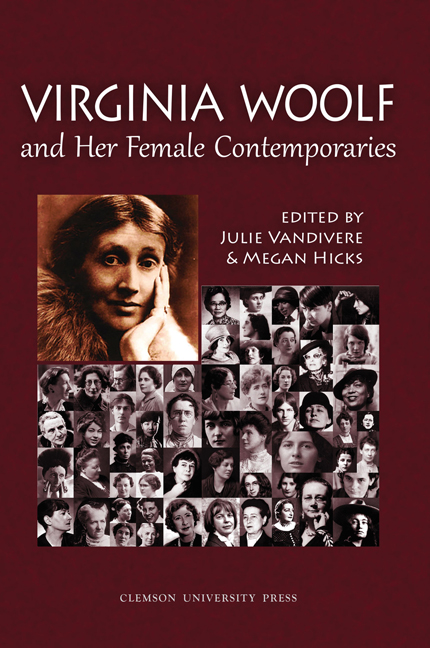Book contents
- Frontmatter
- Table of Contents
- Introduction
- Acknowledgments
- Abbreviations
- Who Are Virginia Woolf's Female Contemporaries?
- Virginia Woolf's Cultural Contexts
- Virginia Woolf's Contemporaries Abroad
- Virginia Woolf's Contemporaries at Home
- “The Squeak of a Hinge”: Hinging and Swinging in Woolf and Mansfield
- “People must marry”: Queer Temporality in Virginia Woolf and Katherine Mansfield
- The Weight of “Formal Obstructions” and Punctuation in Mrs. Dalloway and Pointed Roofs
- Advise and Reject: Virginia Woolf, the Hogarth Press, and a Forgotten Woman's Voice
- Florence Melian Stawell and Virginia Woolf: Home-front Experience, The Price of Freedom, and Patriotism
- Intimations of Cosmic Indifference in Virginia Woolf 's Orlando and Olive Moore's Spleen
- “Could I sue a dead person?”: Rebecca West and Virginia Woolf
- Splintered Sexualities in Rebecca West's The Return of the Soldier, Virginia Woolf 's Mrs Dalloway, and Sylvia Townsend Warner's “A Love Match”
- Sexual Cryptographies and War in Virginia Woolf 's Between the Acts and Elizabeth Bowen's The Heat of the Day
- Tribute to Jane Marcus
- Notes on Contributors
- Conference Program 223
“People must marry”: Queer Temporality in Virginia Woolf and Katherine Mansfield
from Virginia Woolf's Contemporaries at Home
- Frontmatter
- Table of Contents
- Introduction
- Acknowledgments
- Abbreviations
- Who Are Virginia Woolf's Female Contemporaries?
- Virginia Woolf's Cultural Contexts
- Virginia Woolf's Contemporaries Abroad
- Virginia Woolf's Contemporaries at Home
- “The Squeak of a Hinge”: Hinging and Swinging in Woolf and Mansfield
- “People must marry”: Queer Temporality in Virginia Woolf and Katherine Mansfield
- The Weight of “Formal Obstructions” and Punctuation in Mrs. Dalloway and Pointed Roofs
- Advise and Reject: Virginia Woolf, the Hogarth Press, and a Forgotten Woman's Voice
- Florence Melian Stawell and Virginia Woolf: Home-front Experience, The Price of Freedom, and Patriotism
- Intimations of Cosmic Indifference in Virginia Woolf 's Orlando and Olive Moore's Spleen
- “Could I sue a dead person?”: Rebecca West and Virginia Woolf
- Splintered Sexualities in Rebecca West's The Return of the Soldier, Virginia Woolf 's Mrs Dalloway, and Sylvia Townsend Warner's “A Love Match”
- Sexual Cryptographies and War in Virginia Woolf 's Between the Acts and Elizabeth Bowen's The Heat of the Day
- Tribute to Jane Marcus
- Notes on Contributors
- Conference Program 223
Summary
Throughout the first section of To the Lighthouse (1927), Mrs. Ramsay is preoccupied with playing the role of matchmaker for the various guests at her house. Over the course of the day, the idea that “people must marry” becomes almost a mantra for her, repeated in several different instances. Lily Briscoe, for example, remembers Mrs. Ramsay “insist[ing] that she must, Minta must, they all must marry” (49). And when Mrs. Ramsay sees Lily walking alongside William Bankes, she is quick to see a possible match: “Ah, but was that not Lily Briscoe strolling along with William Bankes? She focused her short-sighted eyes upon the backs of a retreating couple. Yes, indeed it was. Did that not mean that they would marry? Yes, it must! What an admirable idea! They must marry!” (71). What is notable about Mrs. Ramsay's statements is not so much her desire to forge romantic unions between her friends and acquaintances but rather her construction of marriage as a mandate, as something all people “must” do.
Indeed, in the first section of the novel, Mrs. Ramsay acts as a force that pushes forward this marriage agenda. Even Paul Rayley, after he has proposed to his future wife Minta, thinks: “He would go straight to Mrs. Ramsay, because he felt somehow that she was the person who had made him do it” (78). In her insistence that “people must marry” (and, later, that “people must have children”), Mrs. Ramsay seeks to place the other characters in the novel on their proper narrative track. She seems to conceive of life as a series of stages that individuals move through toward a predetermined endpoint. Happiness is predicated on moving through these stages properly and arriving at the finish line. She even tells Lily “there could be no disputing this: an unmarried woman…an unmarried woman had missed the best of life” (49).
Mrs. Ramsey, of course, is not as simple as I portray her here. While she literally does urge multiple characters to marry, she is not merely an uncritical purveyor of this idea. She recognizes that she “was driven on, too quickly she knew, almost as if it were an escape for her too, to say that people must marry; people must have children” (60).
- Type
- Chapter
- Information
- Virginia Woolf and Her Female Contemporaries , pp. 157 - 162Publisher: Liverpool University PressPrint publication year: 2016



